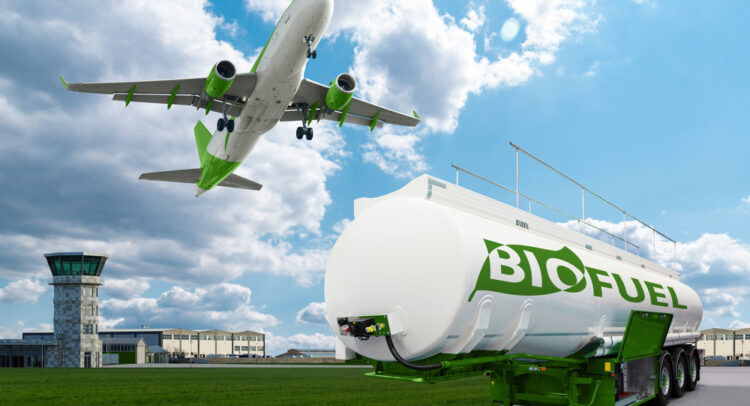At a recent conference of aviation sector executives, David Calhoun, CEO of aircraft manufacturer Boeing (NYSE:BA), said that the idea of producing cheaper green aviation fuel in the future is a myth.
Pick the best stocks and maximize your portfolio:
- Discover top-rated stocks from highly ranked analysts with Analyst Top Stocks!
- Easily identify outperforming stocks and invest smarter with Top Smart Score Stocks
The production of Sustainable Aviation Fuels (SAF), which are made from biodegradable food waste, is intended to lessen the carbonization impact caused by the aviation industry. In contrast to this, the industry now uses traditional kerosene-type fuels like Jet A to cater to mass passenger transport. To gain an understanding of the stark price differential, a gallon of SAF costs over $6.00 currently, while that of Jet A costs nearly one-third as much, at over $2.00 a gallon, as per Argus Media.
Calhoun noted that while mass production of SAF can be achieved in the foreseeable future, the pricing of SAF will never match traditional carbon-emitting fuel prices. “No, I don’t think we will ever achieve the price of Jet A. I don’t think that will ever happen. It is more positive and it will have an impact, but it’s gonna be what it’s gonna be,” he added.
A few others also agree with Calhoun’s thoughts and have said that there are no cheaper ways of producing SAF. In a push towards cleaner energy and undertaking industry-wide decarbonization efforts, the U.S.’s Inflation Reduction Act (IRA) also offered tax credits for SAF production. Meanwhile, the International Air Transport Association (IATA) has set a target of 2050 for achieving net-zero carbon emissions for the sector.
The contention that the higher costs associated with SAF production will be passed on to customers, increasing the cost of aviation travel, is still up for discussion. It’s not feasible for jet manufacturers or air carriers to bear the entire additional cost of using SAF. The other challenge to mass-producing SAF is the procurement of food stock for fuel, which can quickly diminish with rising demand. And yet another challenge is to make all aircraft and airports worldwide adaptable to handle biofuels.
Boeing concluded by confirming that it is on track to make its aircraft 100% SAF-adaptable by 2030. Plus, Boeing is introducing a new modeling tool, Cascade, which will help in assessing the methods of decarbonization.
Is Boeing Stock Expected to Go Up?
On TipRanks, the average Boeing price target of $238.40 implies 15.8% upside potential from current stock levels. Also, Boeing has a Moderate Buy consensus rating based on ten Buys and five Hold ratings. Meanwhile, BA stock has gained 5.4% so far this year.




















